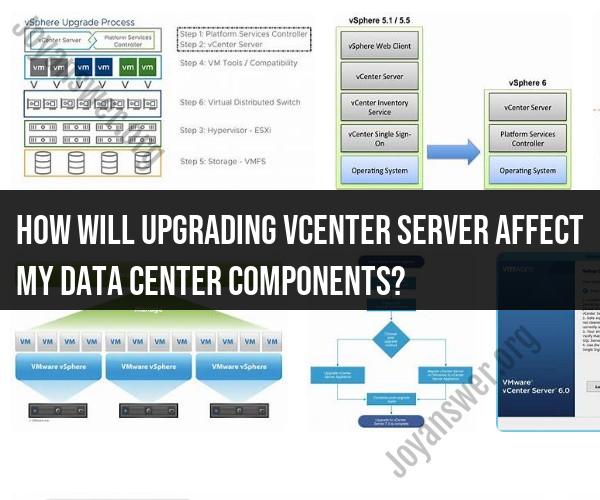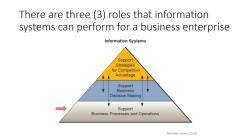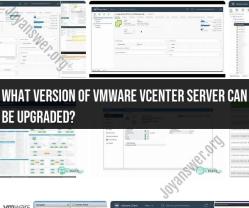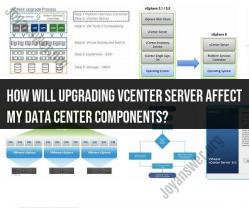How will upgrading vCenter Server affect my data center components?
Upgrading vCenter Server, which is a central component of VMware's virtualization and data center management suite, can have several impacts on your data center components. The specific effects will depend on various factors, including the version of vCenter Server you are upgrading from and to, your existing infrastructure, and any custom configurations you have in place. Here are some potential impacts to consider:
New Features and Capabilities:
- Upgrading vCenter Server often brings new features, enhancements, and capabilities. This can improve the management and performance of your data center components.
Compatibility:
- Ensure that the new version of vCenter Server is compatible with your existing infrastructure, including VMware ESXi hosts, virtual machines, storage devices, and network components. In some cases, you may need to update or upgrade these components to maintain compatibility.
Hardware and Software Requirements:
- The upgraded vCenter Server version may have different hardware and software requirements. Verify that your data center meets these requirements before proceeding with the upgrade.
Migration and Data Transfer:
- Data migration and transfer may be required during the upgrade process. Ensure that your data, configurations, and settings are properly backed up and transferred to the new vCenter Server instance.
License Changes:
- Review any changes in licensing requirements for the upgraded version. You may need to adjust your licensing to accommodate new features or scalability options.
Third-Party Integrations:
- If you have third-party integrations or plugins with vCenter Server, check whether they are compatible with the upgraded version. You may need updates or replacements for these integrations.
Custom Scripts and Automation:
- If you have custom scripts or automation workflows that interact with vCenter Server, test them in the upgraded environment to ensure they still function correctly.
Performance Improvements:
- Depending on the version, the upgrade may bring performance improvements, such as enhanced resource utilization or faster management operations.
Security Enhancements:
- Upgrading can provide security benefits, such as patches for known vulnerabilities and improved security features. Ensure that your data center maintains a high level of security.
Downtime and Maintenance:
- The upgrade process may require downtime or maintenance windows for certain components. Plan accordingly to minimize disruption to your data center operations.
Documentation and Training:
- Update your documentation and provide training for your IT staff to ensure they are familiar with any changes introduced by the upgrade.
Testing and Validation:
- Before upgrading your production environment, conduct thorough testing and validation in a non-production or staging environment to identify and address any issues or conflicts.
Rollback Plan:
- Develop a rollback plan in case the upgrade encounters unexpected issues. Being prepared for potential setbacks can minimize downtime and data center disruptions.
Vendor Support:
- Check with your hardware and software vendors to confirm their support for the upgraded vCenter Server version. Ensure that drivers, firmware, and software components are compatible.
It's essential to carefully plan and execute the vCenter Server upgrade to ensure a smooth transition and minimize disruptions to your data center operations. Consult VMware's official documentation and consider engaging with VMware support or consulting services if needed to ensure a successful upgrade process.
The Impact of Upgrading vCenter Server on Your Data Center
Upgrading vCenter Server can have a significant impact on your data center. Here are some of the things to consider:
- Downtime: vCenter Server upgrades require downtime. This means that your virtual machines will be unavailable during the upgrade. The amount of downtime required will vary depending on the size and complexity of your environment.
- Compatibility: It is important to make sure that all of your components are compatible with the new version of vCenter Server. This includes your ESXi hosts, virtual machines, and third-party applications.
- Performance: vCenter Server upgrades can improve performance, but they can also introduce new problems. It is important to monitor your environment closely after the upgrade to identify and resolve any issues.
Data Center Evolution: How vCenter Server Upgrades Affect Components
vCenter Server upgrades can affect a variety of components in your data center, including:
- ESXi hosts: vCenter Server upgrades can require ESXi hosts to be updated to a compatible version. If you are not careful, this can lead to downtime.
- Virtual machines: vCenter Server upgrades can affect virtual machines in a number of ways. For example, the upgrade may require you to install new tools or drivers on your virtual machines. It is important to test the upgrade on a small group of virtual machines before upgrading your entire production environment.
- Third-party applications: vCenter Server upgrades can also affect third-party applications. For example, some backup and monitoring applications may need to be updated to support the new version of vCenter Server.
Navigating Changes: Understanding the Effects of vCenter Server Upgrades
To mitigate the impact of vCenter Server upgrades, you should carefully plan and execute your upgrade. Here are some tips:
- Back up your environment: Before you start the upgrade, make sure to back up your entire environment. This will give you a safety net in case something goes wrong.
- Test the upgrade: Test the upgrade on a small group of virtual machines before upgrading your entire production environment. This will help you to identify and resolve any potential problems.
- Have a rollback plan: In case something goes wrong, have a plan for rolling back to the previous version of vCenter Server.
- Monitor your environment: After the upgrade, monitor your environment closely to identify and resolve any issues.
By following these tips, you can minimize the impact of vCenter Server upgrades on your data center.




